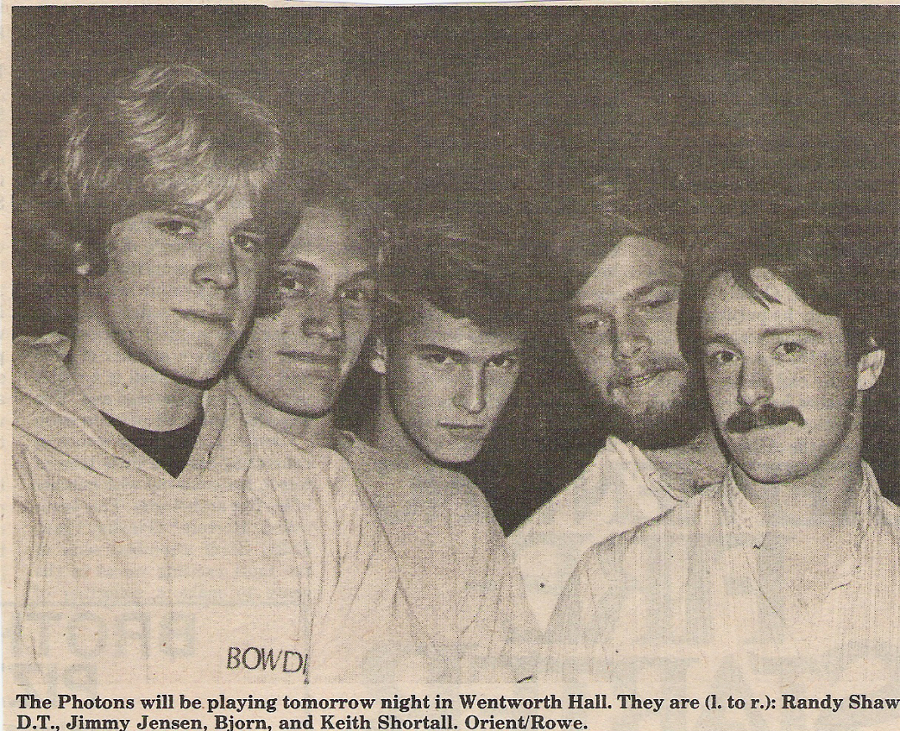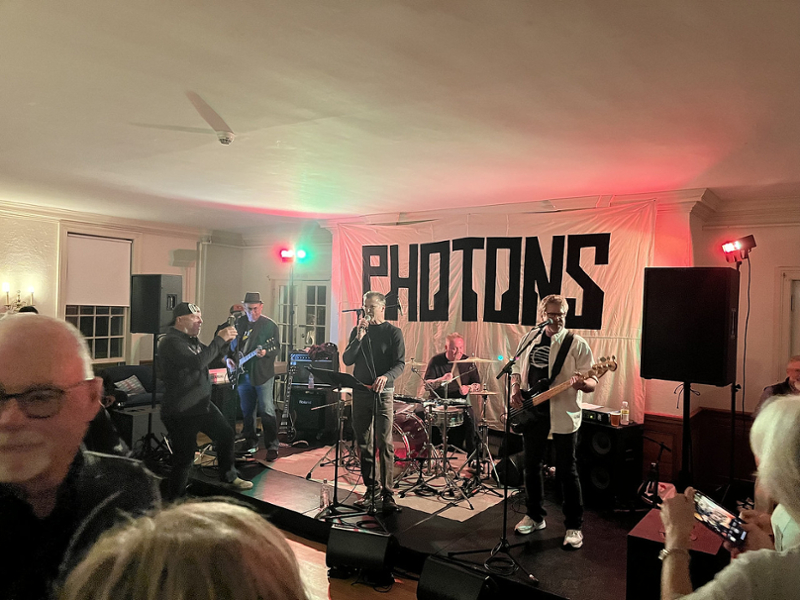Four Decades on, ‘The Photons’ Continue to Rock
By Tom PorterWhat do you call a psychiatrist, a retired actuary, a radio producer, a book editor, and an educational development officer, all of them Bowdoin classmates from the early ’80s? Well, when they’re on stage they’re called the Photons, and they’re still rocking after four decades.
Drummer and philosophy major Keith Shortall ’82 counts in the band, and the magic starts. The years roll away as the Photons groove out to a rendition of Pat Benatar’s “Hit Me with Your Best Shot,” beefed up by the addition of guest vocalist Sue Fischer, Class of 1983.
The band is getting ready to perform at the 2023 Bowdoin College Reunion—their ninth reunion gig in the last sixteen years, says bass player Randy Shaw ’82, an English and psychology double major who went on to become vice president for development and alumni relations at Bowdoin and who still works in educational development.
The full history of the band goes back much further, he adds, to the fall of 1980 (which, to give perspective, is closer to the attack on Pearl Harbor than it is to today). That was when Shaw hooked up with classmate and guitarist Doug Taylor, who already had a reputation as the best, and loudest, axman on campus. “I had played in a couple of bands in Providence,” says Shaw, “and Doug was well known for his guitar playing,” (particularly among his neighbors who were trying to study, notes a Bowdoin Orient article from 1981.)



Shortall, who had a background playing in jazz groups, was recruited to play drums, while classically trained George Reisch ’84 (the only non-classmate) came on board as the second guitarist. “JJ took a little more convincing to join, as he had not sung in a rock band before,” says Shaw, referring to biology major Jim Jenson ’82, now a practicing psychiatrist in North Carolina who, as a student, was known for his incredible vocal skills. “He had an amazing range, still does,” says retired actuary and math major Taylor. “He had just finished singing the lead in a production of Jesus Christ Superstar.”
The band also tried having a piano player for a while, he recalls, but that came to an end when they were kicked out of Gibson Hall (in the music block, where the piano was located) for being too loud. After that they moved to Smith Auditorium, where they jammed most Fridays and where they are rehearsing now.
“These shows are like a time machine that takes you back to a place we can never really experience again." Keith Shortall, philosophy major, radio professional, and occasional drummer.
“And in case you’re wondering where the name the Photons came from, it was suggested by a roommate of Doug’s, who was taking a physics class,” says Reisch—an editor, writer, and book designer, who himself took a physics major. “It’s a great name. I like to think of it as ‘rock and roll at the speed of light.’”
The band’s repertoire consisted, and still consists, of classic rock hits of the ’60s, ’70s, and ’80s, from the Beatles to Bowie, says Shortall, now a senior editor at Maine Public Radio. “After four decades with one rehearsal every few years, you eventually learn the songs,” he adds.
The Photons enjoyed a busy year in 1981, playing at frat parties, the College pub (then called The Bear Necessity), and, memorably, a Halloween party in Coles Tower. They even strayed off campus occasionally, once playing a paid (!) gig at Williams College. The Photons were, without doubt, the biggest band on campus at the time, although, admitted Reisch, “I think we were the only band at Bowdoin in 1980–81.”



After graduation, the Photons disbanded for a quarter of a century, until 2007, when Shaw organized a band reunion to play at their own class reunion. Since then, they’ve returned many times for the early June campus festivities, playing at reunions for the Classes of 1982, ’83, and ’84. The band members are now all in their early sixties (not that old by today’s rock and roll standards), and are showing no signs of slowing down.
“It’s been a lot of fun,” says Jenson, “and great to have that continuing connection. We’ll probably keep doing this until we’re not invited anymore,” he adds. “These shows are like a time machine that takes you back to a place we can never really experience again,” says Shortall. “But for just a few hours, it’s close enough.”